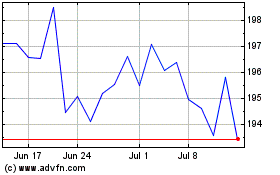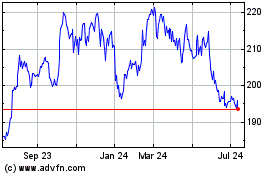Exchanges Edgy on Europe's New Tax - Analyst Blog
August 17 2011 - 10:11AM
Zacks
Yesterday, the shares of stock exchange giants such as
NYSE Euronext Inc. (NYX), NASDAQ OMX Group
Inc. (NDAQ) IntercontinentalExchange Inc.
(ICE) and more witnessed sharp declines as the leaders of France
and Germany announced to propose a financial-transaction tax in
September this year.
As the name suggests, the financial-transaction tax will
primarily target the securities trade, such as equities, bonds and
derivatives, carried out by the exchanges in the Europe. Besides,
the sale of euro bonds has been brought to a standstill by the
European leaders, who also rejected the expansion of €440 billion
($633 billion) rescue fund. The decision has been taken to tackle
the looming debt crisis and restore growth.
It appears that the European leaders are likely to adopt this
tax scheme to address the ongoing economic volatility and
streamline the overall debt-trodden financial structure.
The decision may also have been taken to showcase that the
European leaders are taking steps to reduce its deficits in order
to guard itself from another debt rating downgrade like that of the
US. Ealier this month, S&P ratings had demoted its debt rating
for the US debt to “AA+” from “AAA” given that the financial
regulators failed to cut spending and made formidable deficits
unavoidable.
However, it raises the probability of axing the volumes of the
exchange operators, who generally operate in a cost-sensitive and
high-frequency trading scenario. A tax like this would directly
hurt the sales growth of the stock exchanges since lowering the
trading frequency would mean lower volumes that translate to lower
revenues.
Conversely, such a financial-transaction tax has been proposed
many times in the past. Last year, it was floated in the US’
Dodd-Frank legislation but was scrapped out later given the adverse
impact it would have on the trading volumes and liquidity.
Nevertheless, the London Stock Exchange (LSE) bears the brunt of
tax on equity trades, which has sliced off its volumes, thereby
leaving other operators worried about such tax plan being adopted
in France and Germany as well.
As a result, the US trading sessions witnessed extraordinary
declines in the financial stocks that operated intensively on
European exchanges yesterday. NYSE Euronext, which operates some of
its stock and derivative exchanges in Paris, Amsterdam, Brussels,
Lisbon and London, plummeted 8.4% to $26.54.
Even NASDAQ, the operator of Nordic and Baltic bourses, slipped
2.8% to $22.97. IntercontinentalExchange, which runs a big oil
futures exchange in London, also dipped 4.5% to $111.22.
CME Group Inc. (CME), which has a vast exposure in
Europe, shed by almost 3% yesterday.
Additionally, non-exchange stocks such as Bank of
America Corp. (BAC) and Citigroup Inc.
(C) were down about 4% at the trading-close. Other benchmark
indexes like S&P 500 and Dow Jones also saw moderate
declines.
While we believe a realistic and proactive approach is required
to get Europe out of the debt-trap, it is too early to consider
financial-transaction tax as an apt tool to tackle the big problem
in Europe. Hence, we remain on the periphery at the moment to view
the developments on the issue.
BANK OF AMER CP (BAC): Free Stock Analysis Report
CITIGROUP INC (C): Free Stock Analysis Report
CME GROUP INC (CME): Free Stock Analysis Report
INTERCONTINENTL (ICE): Free Stock Analysis Report
NASDAQ OMX GRP (NDAQ): Free Stock Analysis Report
NYSE EURONEXT (NYX): Free Stock Analysis Report
Zacks Investment Research
CME (NASDAQ:CME)
Historical Stock Chart
From Jun 2024 to Jul 2024

CME (NASDAQ:CME)
Historical Stock Chart
From Jul 2023 to Jul 2024
